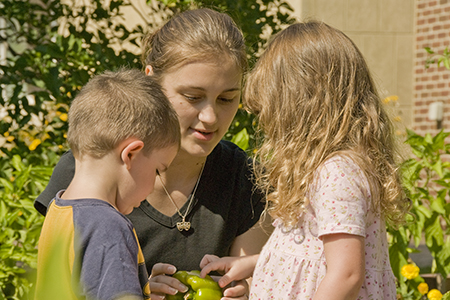Child Development Center Prepares Children, Keene State Students for Success

The Child Development Center at Keene State College looks like a warm, friendly, primary-colored environment for children—and, of course, it is. But it does so much more than that, both providing an environment for young children to develop skills and dispositions that serve them for a lifetime, and acting as a critical foundation for a new generation of early childhood educators.
Keene State College students who work in the CDC, as it’s known on campus, gain valuable skills that their peers at other institutions may not. Teacher preparation models vary widely, and in some practicum or student teacher placements, early childhood education majors get very little exposure to best practices in action –or very little interaction with infants and toddlers. Keene State students are exposed to development starting in infancy, while learning innovative and evidence-based educational approaches in and out of their classrooms.
Those approaches matter to their charges, too. According to CDC director Ellen Edge, the real strengths of the CDC are its teachers, who form secure, trusting attachments with the children in their classrooms, and who facilitate a curriculum that honors the curiosity of each child, allowing students to engage in learning opportunities through open-ended exploration and investigation. This supports sought-after dispositions, like problem-solving and critical thinking.
Developments in brain research also direct attention to early childhood experiences. Studies suggest that as many as twenty percent of young children experience trauma, and those traumas can affect the development of important brain capacities, sometimes described as “executive functions,” like emotional self-regulation, deferment of gratification, and short-term memory storage—all important for high-functioning adults. Consistency in a high-quality educational environment like the CDC, along with the formation of trust and security, can help ease the effects of those traumas so children can thrive.
“All those characteristics that make us functional adults are developed in the brain in the first five years,” says Edge. Early experiences influence later learning (and abilities like responsibility, collaboration, empathy, and teamwork). Positive early experiences with teachers show children that they can succeed in school—or in other interactions with authority figures. The key, Edge says, is in building relationships between children and supportive adults, where children can reach out for connections and communication and come to trust that those adults will reach back. These positive connections foster children’s healthy development during the early years, making them better equipped to be productive members of society later on.





